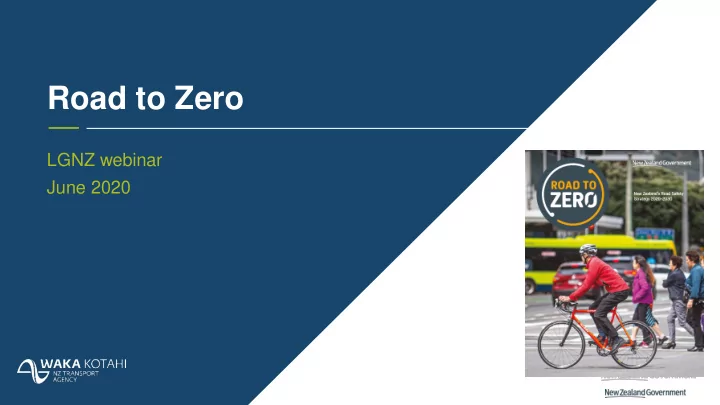

Road to Zero LGNZ webinar June 2020
Our vision is a New Our vision is a Zealand New Zealand where no where no-one is one is killed or seriously killed or seriously injured on our injured in roads any road crash
Evolution of road safety Creating a forgiving system, designed for people that will protect everyone
Change the conversation
Under the Safe System, we accept: that: Vision Zero • People make mistakes is grounded • People are fragile in the Safe • We need to share responsibility System • We need to strengthen all parts of the system
Vision Zero via a Safe System Vision • WHY – Vision Zero is an ethical Zero stance, creating a collective mission • HOW – the Safe System provides Safe System proven principles and a toolbox of evidence based solutions • WHAT - strategies and action plans outline specific interventions Action Plans with timelines, targets and accountability
A Safe System summary of annual road deaths 2019 People Roads & roadsides Speed 72 %* died on roads with a 353 DEATHS speed limit set higher than the SAAS* 55 %* died on roads in the 130 Light vehicle drivers (25+) 82 % * died on roads with a 32 Top 10% requiring speed management Young drivers (16-24) medium or higher IRR** *Safe and appropriate speed 79 Passengers 73 % * died in areas defined as rural 56 Motorcyclists Vehicles 32 177 Pedestrians 47 % * died in 1-star or 2-star died on a state highway 13 Cyclists vehicles 182 81 died not wearing a seatbelt 10 deaths involved the vehicle Truck drivers hitting a roadside object 1 67 died in crashes involving a truck Bus driver 114 died in head-on crashes 57 died in crashes involving Aged six months to 91 years old *Six month sample July-December 2019 $1.54b social cost **Infrastructure risk rating KiwiRAP/UrbanRAP assessment motorcycles
Road to Zero - Strategy outline Safe System
The Action Plan (2020-2022) includes 15 actions Focus Areas Initial Action Plan (2020-2022) 01: Invest in safety treatments and infrastructure improvements Infrastructure 02: Introduce a new approach to tackling unsafe speeds Improvements and 03: Review infrastructure standards and guidelines Speed Management 04: Enhance safety and accessibility of footpaths, bike lanes and cycleways 05: Raise safety standards for vehicles entering the fleet Vehicle Safety 06: Increase understanding of vehicle safety 07: Implement mandatory anti-lock braking systems (ABS) for motorcycles 08: Strengthen commercial transport regulation Work-Related Road Safety 09: Support best practice for work-related road safety 10: Prioritise road policing 11: Enhance drug driver testing Road User Choices 12: Increase access to driver licensing and training 13: Support motorcycle safety 14: Review road safety penalties System Management 15: Strengthen national system leadership and coordination of road safety
Local and regional government have key delivery role
Applying Safe System principles from Transport Agency standards and guidelines
Instructure for highest risk roads Speed around schools and speed management Accessible Streets framework
Work-related road safety practices for local government fleet vehicles
Leadership in local road safety conversations
Delivering on System Management focus area We will deliver the following actions to help local government • lead and partner across the sector to strengthen system leadership, support and co-ordination • offer improved data and analytics products and services via updated Road Safety Action Planning guidance • improve understanding of road safety outcomes for Maori • deliver sector capability building programme in Safe System principles • invest in road safety promotion, education and training • build public support for road safety interventions through a public awareness campaign for Road to Zero and Vision Zero
Questions?
Recommend
More recommend